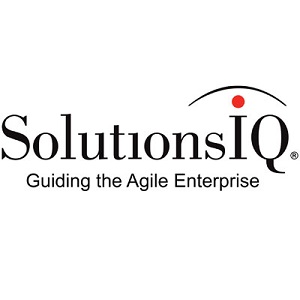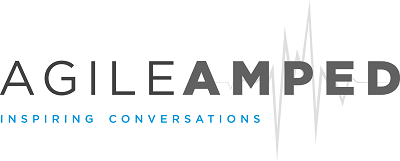Transformation & Change108
Interview with SolutionsIQ
We spoke with Evan Campbell from SolutionsIQ about their approach the business agility and why it's important for their clients.
Evan Leybourn, Evan Campbell
March 3, 2018
We spoke with Evan Campbell from SolutionsIQ about their approach the business agility and why it's important for their clients.
Evan Leybourn, Evan Campbell
March 3, 2018
 Business Agility is a complex topic; from organisation design, adaptive leadership, governance & strategy to agile practices outside IT - it means something different to different organisations. One of the reasons we put on the Business Agility 2017 conference was to explore these topics and bring together leading organisations from around the world. In the leadup to the conference, we're going to showcase some of the companies who are supporting us and explore what business agility means to them.
Business Agility is a complex topic; from organisation design, adaptive leadership, governance & strategy to agile practices outside IT - it means something different to different organisations. One of the reasons we put on the Business Agility 2017 conference was to explore these topics and bring together leading organisations from around the world. In the leadup to the conference, we're going to showcase some of the companies who are supporting us and explore what business agility means to them.
I recently had the opportunity to speak with Evan Campbell from SolutionsIQ. In their own words, "SolutionsIQ is the world’s largest and most experienced leader in Agile transformation and product innovation solutions for business and technology. Our team of 200 Agile professionals includes management consultants, Agile coaches, software developers, and trainers, serving large globally-distributed enterprises throughout the United States, India, and the world. We serve enterprises in diverse industries and regulatory regimes."
Let's start at the beginning. What does business agility mean to you?
Business agility can be hard to pin down – in our innovation and lean startup work, business agility means sensing and responding to customer and market needs with disruptive products and services in an immediate frictionless manner. In our Agile transformation work, business agility refers to the non-IT processes and functions in the value stream that must support responsiveness and short cycle times. Examples may include governance, portfolio management, budgeting, role accountabilities and incentives, leadership skills/styles, and even corporate culture.
Why is it important that business operates in an agile way?
The velocity of market change has never been higher. Barriers to entry have never been lower. Nimble, focused competitors can disrupt legacy revenue streams of dominant enterprises with little warning. Companies must respond to market needs and competitive pressures immediately, and leverage fast feedback to continuously improve both their products and their own organizational environments. They must outlearn their competition in their markets and continuously evolve and adapt the enterprise for higher performance. Those who fail to learn and adapt will be displaced, as Nokia, Blockbuster, and Kodak were.
What have been some of the biggest benefits you've seen? What has been the response from your clients or customers?
The critical impacts we help clients realize are increased market share and revenue growth resulting from producing better products faster, including new generations of products and services. The enabling capabilities supporting this include embracing organizational learning, empowering highly engaged employees, and leveraging continuous improvement to sense organizational limitations and adapt the enterprise continuously.
Where did you start, what triggered you to become and agile organization?
We recognized the need to help risk-averse organizations overcome the cultural and systemic impediments that were preventing them from achieving their business goals dependent on IT delivery and product/service innovation. Most large enterprises don’t possess a competency in large scale change management, and they tend to underestimate their own inertia and the impact Agile will have on the enterprise beyond IT. SolutionsIQ evolved a change management approach that assures delivery of strategic business results in the most challenging enterprise change environments.
What are the top 3 indicators that show an organisation is ready to take agile outside IT?
Stable persistent development teams are delivering high quality potentially releasable software every two weeks or less, with short cycle times from idea to production. Their throughput statistics are stable, indicating predictability. At this point, the impediments to higher value delivery are likely outside development’s authority to change. While it’s highly advisable to engage line of business and corporate leaders’ sponsorship in the beginning, sometimes IT must demonstrate the ability to ship quality software rapidly before the case can be made to address inefficiencies in portfolio and phase gate processes, or HR role/incentive impediments (as examples).
What do you see are the biggest obstacles companies face in being agile?
Obstacles (and common failure patterns) include:
Why should someone come to Business Agility 2017?
Business Agility 2017 has an amazing roster of speakers and luminaries representing expertise in a vast range of critical business capabilities on the next frontier of agility, beyond IT. It is essential for enterprises to master these capabilities in order to reap the transformative business impacts agile can potentially enable.

SolutionsIQ will be bringing the Agile Amped podcast to Business Agility 2017. The Agile Amped podcast series connects the community through compelling stories, passionate people, shared knowledge, and innovative ideas. Fueled by inspiring conversations with industry thoughtleaders, Agile Amped offers valuable content – anytime, anywhere. Subscribe here: http://www.solutionsiq.com/agile-amped/
Please subscribe and become a member to access the entire Business Agility Library without restriction.